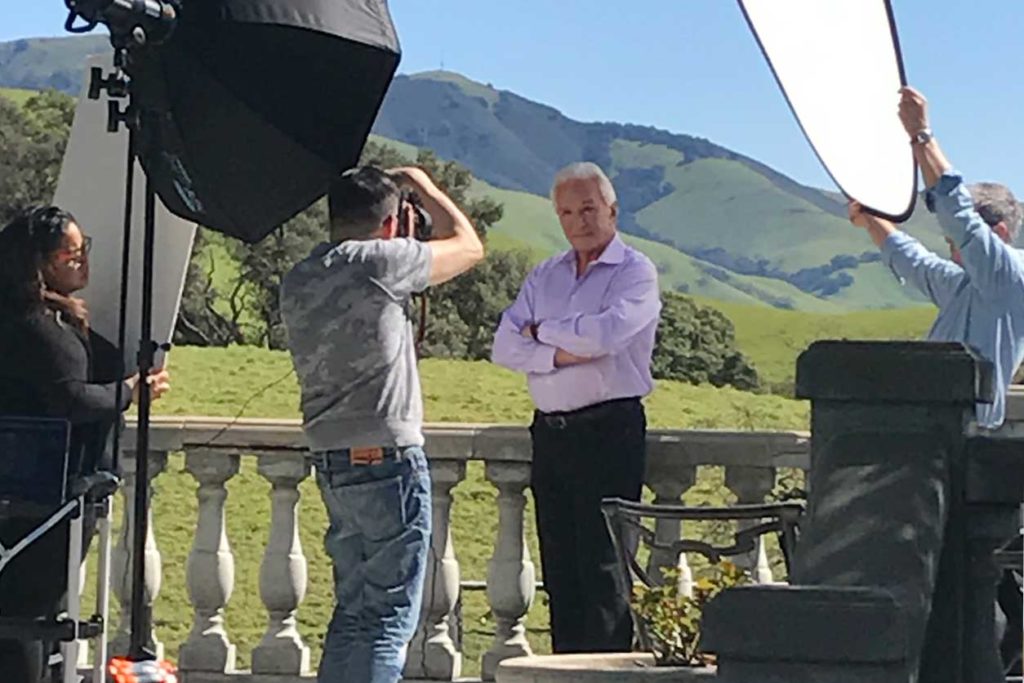This week I kick off this updated website with a promise. I intend to use this exciting media web world to help educate, inspire and motivate friends and long-time fans about the new world of business with the perspective of a career business journalist and entrepreneur.
Those of you who have followed my long career may wonder why I take on this “new job” at an age when I should be playing golf or just sitting on my achievements, fondly recalling the thousands of television stories and radio interviews I’ve produced in the US and around the world over four decades.

The professional reason is to place lessons learned from the good, the bad and the really bad business people I’ve interviewed over the years into today’s context at a time when perspective and knowledge are so vital. The personal reason is I want to retire the word “retirement”. Here’s why.
Remember when Veteran CBS newsman Mike Wallace announced his retirement at age 87; saying it would be his last season on “60 Minutes”. But he retained the title of “correspondent emeritus” and stressed he would never officially retire. He said at the time he was “slowing down, but not to a halt”. He did part time assignments for two more years, and died in 2012 at age 93.
But the man famous for breaking stories was not breaking new ground. His legacy is but one of millions of workers challenging the notion that retirement means riding off into the sunset. Today it’s more about life style changes than getting too old to work.
During my 16 year tenure on air as Business Editor for KTVU Channel Two News in the San Francisco Bay Area, I had the privilege of working with well respected news director Fred Zehnder. He ran what was then considered the best local news operation in the country. But despite the accolades and daily “rush” of the TV news business, Fred pulled the plug.
Zehnder voluntarily “retired” from his high profile high pressure job at 65, and flew off to a well earned vacation in Hawaii, courtesy of KTVU. (Sure beat the gold watch sendoff of decades past.) Upon his return, he expanded his part time hobby of running a local weekly newspaper into a full time job owning a string of weekly locals.
So much for “retirement”. Fred told me at lunch when he turned 74 that he was busier (and happier) that ever. And he is not alone with Mike Wallace in defining the new work world for older Americans.
My former eye Doctors also focused on their futures. At the ages of 70 and 65, David Thier (MD) and Jerold Janks (OD) cut their San Francisco office hours to two and a half days a week. Dr. Thier told me, “Retirement is a bad word. Let’s start using the word ‘transition’ because it’s better for our mental health.”
In fact, their profession seems to be practicing what these guys are preaching, and not just for political correctness.
Senile macular degeneration (SMD) is now called age related macular degeneration (ARMD). Senile cataracts are now just cataracts. And there are plenty of eye-opening statistics to show that the medical profession will care for a lot more patients for a lot longer.
Baby boomers start turning 72 this year, and are expected to live longer than any other generation in American history. Advances in medical care, the elimination of diseases and better nutrition have pushed average life expectancy to at least 83 years, according to Census Bureau statistics. That means the average retiree could live another 18 years in reasonably good health, quite an increase since 1900, when the average retirement lasted just 1.2 years.
And according to an AIG Sun America retirement survey, those newly minted retirees do not just play bridge or sit on a couch and watch re-runs of Star Trek. The survey found 95 percent of pre-retirees (age 55 to 61) expect to work in some capacity in their retirement, either because they have to or they choose to.
And their attitudes have changed dramatically. In a focus group of pre-retirees, the survey found none considered retirement to be a winding down or ending. When asked for alternatives for the word “Retirement” they came up with phrases such as “Second Beginnings,” “Life Change,” “Fresh Start,” and “New Chapter.”
Yet according to Webster’s Dictionary, retire means “to withdraw oneself from business, public life or active service”. Perhaps Webster needs to update its definition, and I’ll bet Stan Bromley would agree.
The nationally respected hotel executive surprised his Four Seasons bosses and many friends a decade ago by “retiring” at 61. He told me he’s entering “my new phase of business life, my hobby career, allowing the accelerator to go from 100 to 80 to 60 while still practicing the art of inn keeping”.
After just three days of “retirement”, word got out and he was offered a part time job advising for the luxury Meadowood resort and The Napa Valley Wine Preserve in wine country. He accepted, calling it “a better life/work balance than before.” Stan said after spending years building careers and reputations, we can “use that currency to build new relationships with business leaders who see us as valuable assets who bring a lifetime of experience to new situations”.
Maybe it’s time to push that “set in stone” retirement age of 65 back at least 10 years, or just get rid of the word “retirement” entirely. After all, medical professionals diagnose 60 as the new 50, perhaps why some are making career changes well before 65.

Off to anther interview and speech.
UC Berkeley Labor specialist Professor Harley Shaiken agrees, telling me “more than ever, retirement has become a beginning for workers rather than an end.” But Shaiken adds, “For those whose retirement is shaky or collapsed, it’s more about uncertainty than satisfaction”. That problem, and the impact of an aging workforce on younger workers, is left to a later column.
Yet whether one wants to or needs to work, there are so many more opportunities for older Americans to enrich their minds and bank accounts than ever before, while contributing to a society that benefits from the stabilizing influence of an engaged older generation of workers.
Just imagine how many scam artists, crooked corporate leaders and corrupt politicians would still be plying their twisted trades were it not for Mike Wallace knocking on their doors in the 24 years since he turned 65.
(Brian Banmiller is a national Business reporter for CBS News Radio, writer and public speaker. The former television business news anchor in San Francisco is not “retired”, and can be reached at brian@banmilleronbusiness.com .)
This article was originally published on December 8, 2017.

About Brian
CBS News Radio national business journalist Brian Banmiller has spent more than 40 years in the news industry, covering business, politics and the economy on television, radio and in print. Currently, his “Banmiller on Business” reports are delivered to an audience of millions nationwide.

